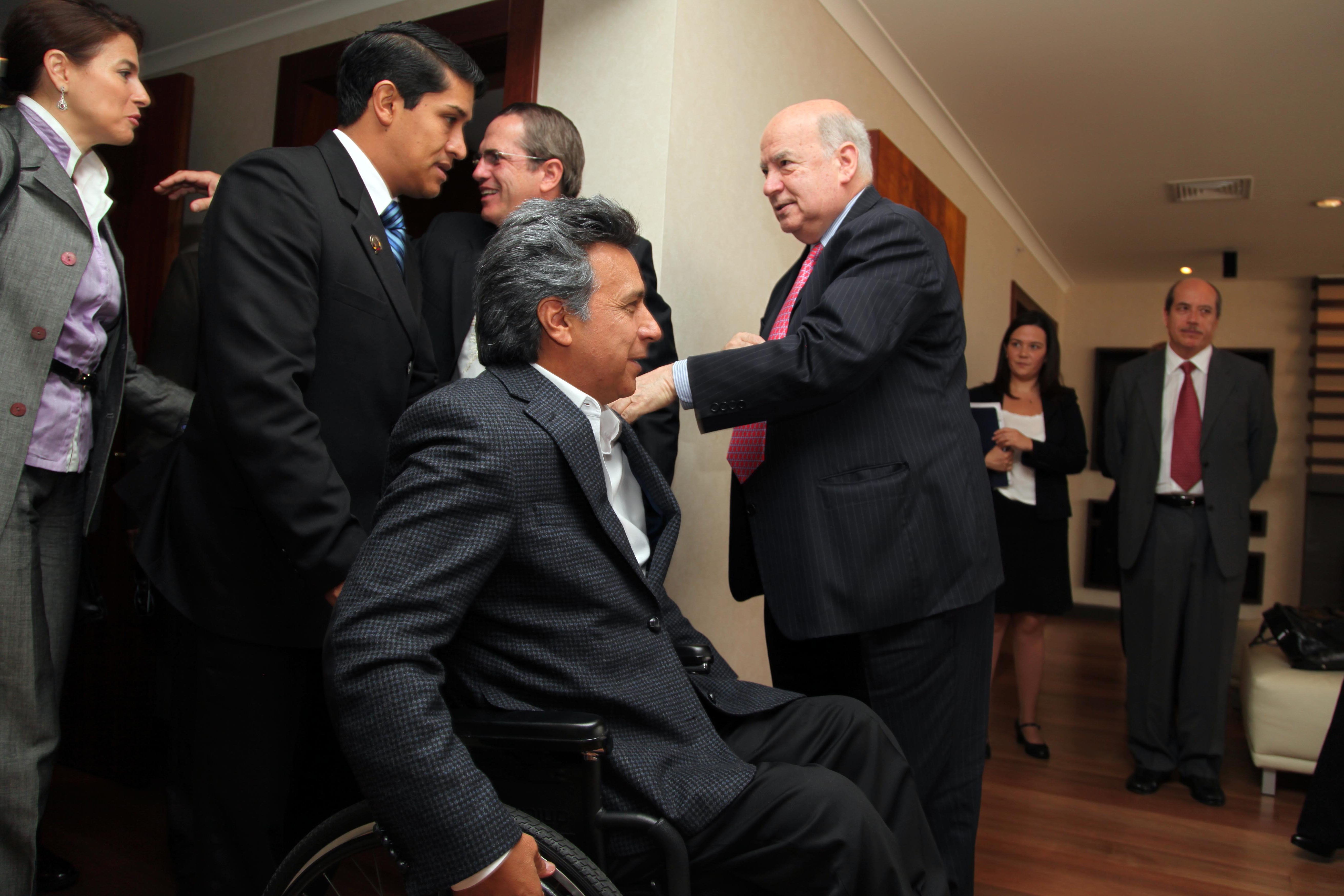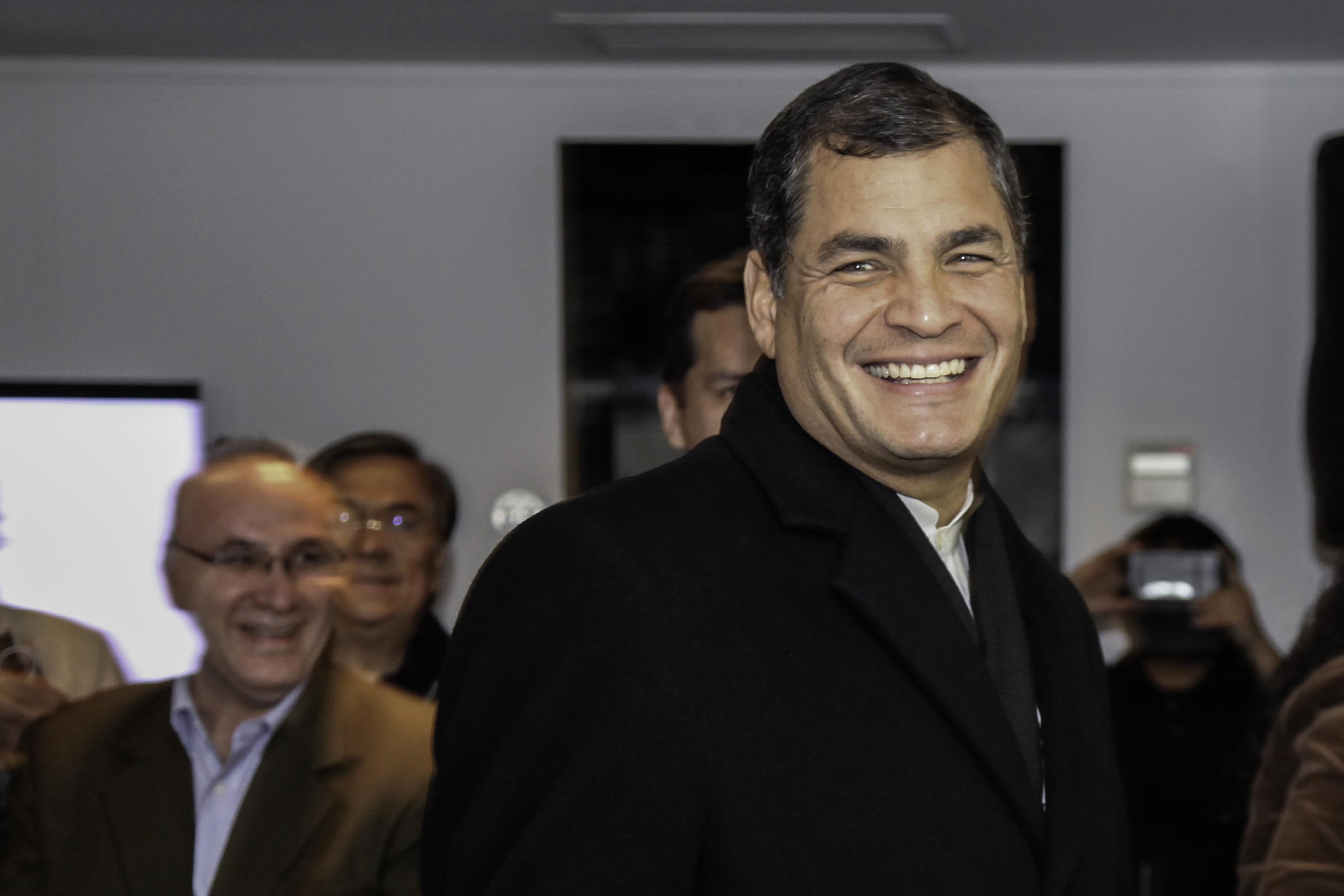Lenin Moreno was desperate to ingratiate his government with Washington and distract the public from his mounting scandals, writes the Grayzone’s Denis Rogatyuk.
By Denis Rogatyuk
Grayzone
 The images of six Metropolitan police officers dragging Julian Assange out of the Ecuadorian embassy in London have enraged citizens around the world. Many have warned that if he is extradited to the U.S. for trial on conspiracy charges – and possibly much more if federal prosecutors have their way – it will lead to the criminalization of many standard journalistic practices. These scenes were only possible thanks to the transformation of Ecuador’s government under the watch of President Lenin Moreno.
The images of six Metropolitan police officers dragging Julian Assange out of the Ecuadorian embassy in London have enraged citizens around the world. Many have warned that if he is extradited to the U.S. for trial on conspiracy charges – and possibly much more if federal prosecutors have their way – it will lead to the criminalization of many standard journalistic practices. These scenes were only possible thanks to the transformation of Ecuador’s government under the watch of President Lenin Moreno.
Since at least December 2018, Moreno has been working towards expelling the Wikileaks publisher from the embassy. The Ecuadorian president’s behavior represents a stunning reversal of the policies of his predecessor, Rafael Correa, the defiantly progressive leader who authorized Assange’s asylum back in 2012, and who now lives in exile.
While Ecuador’s Foreign Minister Jose Valencia blamed his government’s expulsion of Assange on the Australian journalist’s “rudeness,” the sellout is clearly a byproduct of Moreno’s right-leaning agenda.
Political instability has swept across Ecuador since revelations of widespread corruption in Moreno’s inner circle emerged. The scandal coincided with Moreno’s turn towards neoliberal economic reforms, from implementing a massive IMF loan package to the gradual and total embrace and support for U.S. foreign policy in the region. In his bid to satisfy Washington and deflect from his own problems, Moreno was all too eager to sacrifice Assange.
INA Papers Scandal
WikiLeaks’s decision to re-publish the details of Moreno’s use of off-shore bank accounts in Panama, titled “INA Papers” after the name of the shell corporation at the center of the scandal (INA Investment Corporation), appear to be the main cause for the president’s decision to expel Assange from the embassy.
Ecuadorian Communications Minister Andrés Michelena went as far as claiming that the INA Papers were a conspiracy plot between Julian Assange, the former President Rafael Correa and the current Venezuelan President Nicolás Maduro.
The INA Papers scandal has cast a long shadow on Moreno’s regime and shattered its pledge to fight against institutional corruption. The scandal reveals that a close associate of Moreno, Xavier Macias, lobbied for the contract of the Coca Codo Sinclair hydroelectric power plant (valued at $2.8 billion) as well as the ZAMORA 3000 MW plant to be awarded Sinohydro, a Chinese state-owned construction company.
The financial trail from the Chinese corporation passed through bank accounts in Panama belonging to INA Investment Corporation — a shell company originally founded in Belize, a notable tax haven, by Edwin Moreno Garcés, the brother of the current president. The most crucial pieces of evidence indicate that the INA Investment funds were used to purchase a large apartment in Alicante, Spain, and a number of luxury items for Moreno and his family in Geneva, during his time as a special envoy on disability rights for the United Nations.
As the pressure mounted on Moreno, the attorney general of Ecuador issued a statement on March 19th, indicating that it had commenced an investigation into the INA Papers scandal involving the president and his family. Next, on March 27th, the National Assembly of Ecuador approved a vote in favor of investigating Moreno’s alleged off-shore bank dealings in Panama. According to Ecuador Inmediato, 153 public service officials, along with all members of the National Assembly, were also included in the initial public hearing scheduled for April 1st.
The corruption scandal came amid a number of other prominent crises disrupting both the Moreno administration and the Ecuadorian economy. The local and regional elections of March 24th, as well as the election to the Council of Citizens’ Participation and Social Control (CPCCS) on March 24th, have been riddled with a series of controversies and irregularities with regards to vote counts and allegations of fraud, including the attempts to invalidate null votes, disqualify and smear the candidates endorsed by ex-President Rafael Correa. The stunning lack of transparency and legitimacy was highlighted by a report of the mission of electoral observers of the Organisation of American States.
In an unusual twist, the U.S. ambassador, Todd Chapman, was spotted visiting the headquarters of Ecuador’s National Electoral Council during the March 24th elections and allegedly participated as an official electoral observer in the elections. This display of interference was widely condemned on social media as illegal under the current electoral rules, which forbid foreign powers from playing any active role in the electoral process. But in Moreno’s Ecuador, it was a perfect symbol of the new status quo.
IMF Deal
During the recent meeting of the executive board of the IMF, the financial body approved a loan package of $4.2 billion to the government of Lenin Moreno for what it called a “more dynamic, sustainable, and inclusive economy for the benefit of all Ecuadorians.” The agreement coincided with layoffs of over 10,000 public sector workers, in addition to the ongoing policy of slashing in public and social spending, a decrease in the minimum wage and the removal of secure work protections that marked the sharp neoliberal turn of the Ecuadorian government under Moreno.
The IMF deal coincided with the intensifying attempts by the Ecuadorian government to proceed with the expulsion of Julian Assange from its London embassy. His arrest therefore stands as a sign that Moreno is willing to give up any part of his country’s sovereignty – political, diplomatic, or economic – to comply with the demands of international finance.
The same pattern has been seen in Moreno’s increasing level of collaboration with the Trump administration and its foreign policy in Latin America. From holding private meetings with former Trump campaign manager Paul Manafort, to publicly hosting Vice President Mike Pence in the Ecuadorian presidential palace, to authorizing the opening of a new “Security Cooperation Office” in place of the old U.S. military base in Manta, Moreno’s embrace of Trump’s “Monroeist” policy towards Latin America has become all too apparent.
At the same time, Moreno has gone to great lengths to undo the progress of Latin American unity and integration initiated by his predecessor and other progressive leaders in the region.
On March 13th, Moreno announced that Ecuador would leave the Union of South American Nations (UNASUR), founded in 2008 by leaders of South America’s so-called pink tide: Nestor Kirchner of Argentina, Hugo Chavez of Venezuela and Lula Da Silva of Brazil. The project was inspired by the long-standing vision of Simon Bolivar who envisaged South America as a federation of republics. UNASUR was meant to consolidate the growing economic and political integration among the increasingly progressive governments across the region, ultimately emulating the current structure of the European Union.
Moreno complained in his press release that UNASUR has been compromised by the lack of participation of the right-leaning governments in the region, as well as what he called, “irresponsible actions of certain leaders that replicated the worst vices of socialism of the 21st Century.”
In a manner similar to Francisco Santander and the project of Gran Colombia during the 1820s, Moreno has opted for a pro-U.S. foreign policy and commercial relations based on free trade and economic liberalization. He has also followed the path of other right-wing leaders in the region such as Brazil’s Jair Bolsonaro and Argentina’s Mauricio Macri in officially recognizing Juan Guaidó as the president of Venezuela. Moreno was even among the attendees of the founding summit of Prosur, a newly convened regional bloc of U.S.-aligned neoliberal governments.
Moreno’s decision to silence Julian Assange and expel him enabled the president to gain the trust of the Trump administration while distracting the Ecuadorian public and international media from his mounting crises at home. From corrupt dealing in off-shore bank accounts, the fraudulent elections of March 24th and his mishandling of the Ecuadorian economy, Moreno is in a world of trouble.
This has not escaped the notice of Correa, Ecuador’s former president. After having his page blocked on Facebook, Correa stated that “In his hatred, because Wikileaks published corruption of INA papers, Moreno wanted to destroy Assange’s life. He probably did it, but he has also done a huge damage to the country. Who will trust in ECUADOR again?”
Overall, Ecuador has come to resemble the neoliberal regimes of the 1990s across the continent, with IMF-sanctioned austerity, increasingly unstable state institutions and an almost complete obedience to the U.S. foreign policy in the region becoming the new policy standard. Handing Assange over for possible extradition to the U.S. was the inevitable result of Moreno’s turn to the right, but it is hardly the end of his sell out.
Denis Rogatyuk is a Russian-Australian freelance writer, journalist and researcher. His articles, interviews and analysis have been published in a variety of media sources around the world including Jacobin, Le Vent Se Léve, Sputnik, Green Left Weekly, Links International Journal, Alborada and others.





The Lenin Moreno INA accounts hidden in tax havens, Panama and Costa Rica is where the ransom payment was hidden. Moreno began getting payments when he was heading the UN’s disability agency. This Agency at the UN was created for Lenin Moreno. He was the first person to head it, and this was after Julian Assange took refuge in the Ecuadorian Embassy in London. Lenin Moreno was a CIA sleeper agent from the beginning.
All around the world, the World Socialist Web Site (WSWS[dot]org) has provided extensive coverage of, and sought to promote, the defense of Julian Assange. Just today, the WSWS has ten articles on its front page, with extensive information and reporting on protests, from Australia to the US to Europe to Sri Lanka. US Autoworkers have issued a statement in his defense, which is being distributed at factories, esp throughout the US MidWest.
Just one or two of these critical articles:
Stop the Extraordinary Rendition of Julian Assange! https://www.wsws.org/en/articles/2019/04/15/pers-a15.html
SEP & IYSSE rally in Sri Lanka to defend Assange: https://www.wsws.org/en/articles/2019/04/17/rall-a17.html
Julian Assange’s extraordinary record of Investigative Journalism: https://www.wsws.org/en/articles/2019/04/18/asre-a18.html
John Pilger has characterized the “Main Stream Media” as “Vichy journalists.” These toadies are showing that they have well earned the title!
A very tight argument here; however, there is not a shred of direct evidence (statements, emails, etc.) backing it up to prove that is the way things actually went down.
Circumstantial evidence aside, the official explanation then holds for now. We all know how much of a “pain in the ass” Julian Assange can be for the powers that be, including diplomatic corps personnel. It could have been that even in pre-Moreno times, Assange proved to be harder to handle in the cramped Ecuadorian Embassy than expected, presenting a serious distraction from whatever diplomats consider “business as usual.”
It seems that Assange’s version of “asylum” and that of the Ecuadorian Embassy came to a critical impasse…
Julian Assange life was made miserable, with passive aggressive tactics to force Assange to leave the embassy. The Rafael Correa embassy foreign/diplomatic staff had excellent relations with Ecuadorian citizen, Assange. It was trator and CIA agent Moreno’s staff who made live miserable for Mr. Assange.
“In an unusual twist, the U.S. ambassador, Todd Chapman, was spotted visiting the headquarters of Ecuador’s National Electoral Council during the March 24th elections and allegedly participated as an official electoral observer in the elections.”
How are they supposed to know who won the election without the U.S. ambassador there to tell them?
I have to hand it to Julian Assange he sure is a man made of principle. I’m not sure I could muster up the courage he did as he reported on the INA Scandal knowing full well he was exposing his landlords (Moreno) misdeeds. But isn’t this what Julian Assange is all about exposing the truth?
There have been in the US over the last five years almost 100,000 whistleblowers. So when some one argues over conspiracy theories and say, ‘we’ll surely someone would have talked’ well then think of the 100,000 who are trying.
https://www.gao.gov/assets/700/697337.pdf
Joe – I don’t think Julian could report on the INA scandal nor did Wikileaks initially expose it. Julian had all his communications cut off and taken away long ago now. I concur he is, indeed, a man of principle.
His excuse could be Moreno cut off his links to Wikileaks I guess… not sure on details.
No, Joe. Moreno took away all of his internet, phone, etc. He had no access to a computer at all.
What is there to say about the legality and consequent recources in European and/or international courts as far as revoking political asylum? And is Assange still an Ecuadoran citizen? Does Ecuadoran law provide him any protections?
Just prior to their abject betrayal of not only Assange but also their own sovereignty by inviting the British cops into their embassy, Ecuador “suspended” Julian’s Ecuadorean citizenship.
If you want to know what “suspension of citizenship” means – I have no idea, never heard of such a thing before.
It will useful to hear the sources of Moreno’s campaign funding and media influences, certainly from the Ecuador oligarchy, and almost certainly with covert US funding, such as those excusable little multi-trillion dollar “errors” at DoD, and AID, NED, and other US anti-democracy agencies.
Future progressive governments will know, as Cuba knew, that they must completely eradicate the rich or be overthrown. There will be innumerable such examples to guide those who restore democracy in the US. Imprison or expel the rich, or be destroyed by them. Once the US and other large oligarchies are permanently prohibited, and progressive democracy is restored here, the progressive democracies elsewhere can be more inclusive, but not before then.
The scum rises to the top. Poor Ecuador. Victim of the worst of their people gaining power, of course with the aid of the worst scum in our world – in the USA.